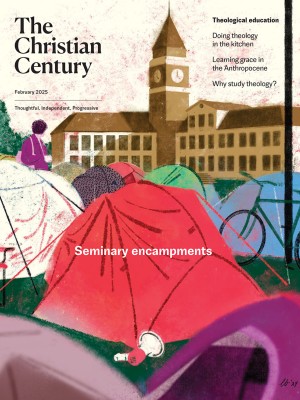February 23, Epiphany 7C (Genesis 45:3–11, 15)
Joseph’s brothers witness love in action, in both his personal forgiveness and his prudent national planning.
During the summer before my junior year in high school, my father required major surgery. He had ignored the symptoms of an illness for a long time, so there was not high confidence that this procedure would save his life. Nevertheless, he wanted to do everything that he could to position himself for a good outcome.
On the evening before his surgery, I arrived at the hospital to spend time with him and my mother, and from down the hallway I could hear laughter coming from his room. I recognized the voices of my parents, but there was another voice mingled with theirs. When I entered the room, I was shocked to see my older brother, Gary. For more than five years my brother and my father had not spoken a word to each other. But my father’s illness brought them back together, and I beheld the shocking sight of Gary standing at my father’s bedside, reconciliation underway in its infant stages, the two of them laughing as they had laughed in the past.
Read our latest issue or browse back issues.
“I am your brother, Joseph.” In this Sunday’s story from Genesis, these few words find their way through years of separation and estrangement and touch the hearts of Joseph’s brothers. Maybe my brother spoke similar words when he first saw my father after their long separation. I am your son, Gary.
The human capacity for forgiveness is on full display in the biblical story about Joseph and his reunion with his brothers. It was told hundreds of years before Jesus broadcast love for enemies as a cornerstone of his teaching, many centuries before Martin Luther King Jr. made the watchword “love your enemies” a driving philosophy of the civil rights movement.
But part of the appeal of Joseph’s story is that another feature of his character is also worthy of celebration. Joseph mentions twice to his brothers that their reunion is taking place against the backdrop of a seven-year famine, of which five years remain. He shares this information not to alarm them but to let them know that he has used his position to prepare for the likelihood of such a threat. The food reservoir set aside for the nation will last, because the leader who needed to lead by diligently preparing for the devastating impact of a famine has done his job well. Joseph’s brothers are now seeing two expressions of love in action: forgiveness on a personal level and prudent planning on a national level.
Joseph’s agricultural policy may not be as attention-getting as his nearly inconceivable act of forgiveness, but it is no less significant. Through vigilant stewardship Joseph saves the lives of thousands of people, including those of his formerly estranged family.
Joseph has a lot to teach us about the use of power. And there is no doubt that he sees himself as a person in whom much power has been entrusted. He describes himself as “lord of all [Pharaoh’s] house and ruler over all the land of Egypt.” And he ascribes his position and authority as a divine mandate: “God has made me lord of all Egypt.”
So in some ways he is the same old Joseph. He is still making sure that everyone knows how cool he is, how he is on top of the world. But he has come to understand power in a new way: as something that’s for the common good, not just personal glorification. He understands that power can give us the courage to forgive those who hurt us. He understands himself as an agent of God, and he understands that the purpose of that agency is to do the kinds of things that great leaders do, like helping a nation survive a catastrophic famine.
This story shows us a man who has matured from his early years, who has met many challenges and found a way to transcend them, who is capable of love in the form of personal forgiveness as well as love in the form of wise stewardship over national resources. This is a kind of maturity that we ache to see in our political leaders today.
In a prayer that my congregation in Connecticut uses as a regular part of its weekly worship, we ask God to “make each one of us an instrument in thy hands for good” and to “make us earnest and true, wise and prudent.” In this way we claim our God-given power to be a force for good. And we celebrate that old New England virtue of prudence, which gives us the discipline and patience necessary to be good stewards of God’s gifts for the lean times. Joseph beautifully exemplified these dimensions of great leadership. Now it’s our turn.






